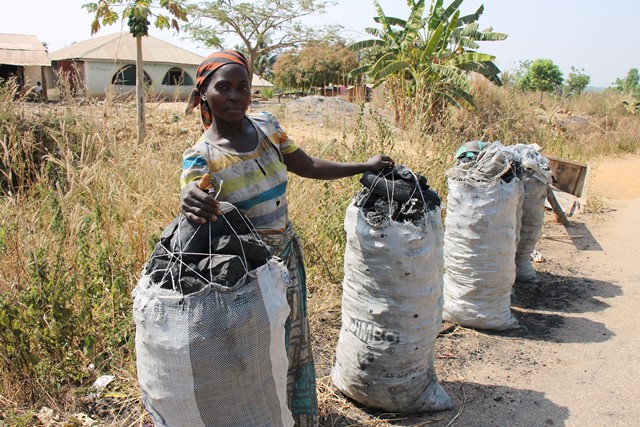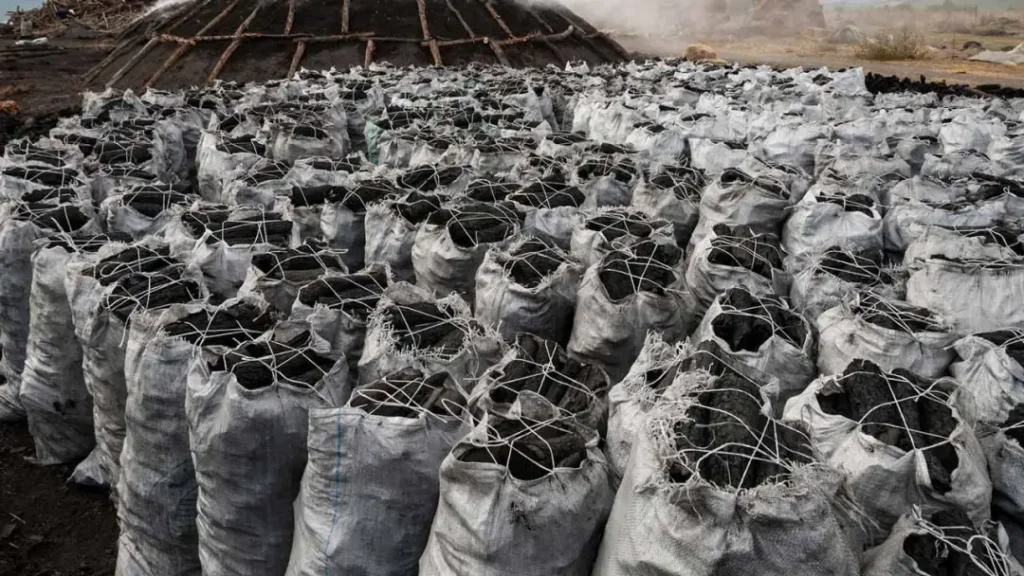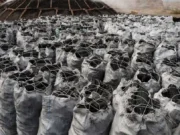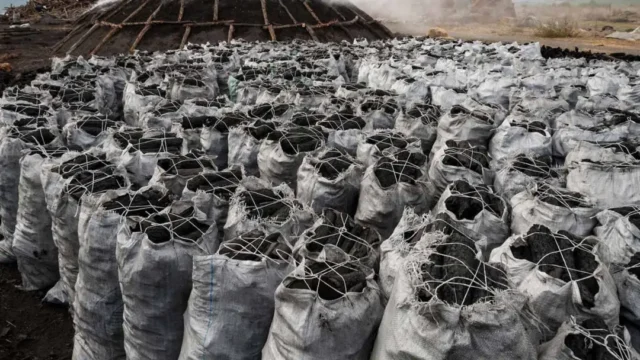In many parts of our dear Nigeria, charcoal farming is not just a business—it is a lifeline. Yet, beneath the swirls of smoke rising from makeshift kilns, a grim story unfolds: one of ecological destruction, health hazards, and a struggle for survival. Our nation seems caught in a perilous love affair with charcoal, one that fuels poverty even as it dims our forests and threatens lives.
Poverty and lack of alternatives are the tinder that keeps this romance burning. Many rural Nigerians, cut off from reliable electricity or gas, rely on charcoal because it’s cheap and quick to produce, especially compared to slow-yield farming or the steep cost of cooking gas. As researchers note, poverty drives both production and use, with marginalised communities turning to charcoal not out of choice, but necessity.
Table of Contents

The Smoke Behind the Soot
The toll of Nigeria’s charcoal frenzy is heavy, both on our land and our bodies. In places such as Igangan, Oyo State, journalists describe scenes that speak louder than statistics—kilns billowing smoke that blankets forest canopies, fields, even homes. Workers like Ayo Alalade, hardened yet hurting, trudge through the fumes without flinching. It’s a routine hazard that has become their bleak normal.
Beyond deforestation, the health risks are insidious. Charcoal workers inhale toxic fumes daily; studies suggest connections to respiratory ailments, kidney and liver damage, and even fatalities. That is compounded by global data showing that around 4.3 million people die each year worldwide due to inefficient use of solid fuels like charcoal and firewood, according to ICIR Nigeria.
Forests Falling, Farms Failing
The consequences of charcoal farming stretch well beyond the kiln. As the saws fall and ash rises, woodland retreats, giving way to soil erosion, arid farmland, and biodiversity decline. The land, once rich for crops and sustenance, degrades beneath our fingertips.
In Nasarawa and Kogi States, investigations reveal how entire groves are stripped for charcoal production. Women like Ankali Joseph admit to felling up to 30 trees per cycle, yet earning a paltry income in return. Meanwhile, local governments grapple with revenue loss and environmental collapse, as once-thriving forests vanish in exchange for meagre profit.

A Romance of Convenience—But at What Cost?
For many producers, the appeal is clear: charcoal brings quick money, and it’s resilient against economic storms. A machine-powered chain saw or hand-assembled kiln yields cash faster than farming ever could. Rural dwellers—especially unemployed youth—are drawn to it, even if they are fully aware of the long-term toll.
Yet every sack sold carries the weight of deforestation, ecosystem loss, and potential collapse of future livelihoods. By trading trees for temporary relief, communities gamble with their very survival.
Glimmers of Hope: Steps Toward Redemption
But it’s not all despair. Across the country, voices of reason and action are rising:
- Reforestation efforts: In Kogi State, the “Green Vigilante” initiative recruits youth to plant and protect trees. The government distributes seedlings and forms forest-management committees to safeguard the surroundings.
- Alternative fuels: Experts urge the production of briquettes made from sawdust, offering a safer, cleaner substitute to traditional charcoal. This could curb tree-felling and provide new livelihoods.
- Energy transition: Scholars and advocates call for stronger electricity provision and cheaper cooking gas, so families aren’t forced to resort to charcoal. Guaranteeing reliable energy could reduce demand by as much as 30%.
Why the Romance Persists
Why does this dangerous love affair endure? The reasons are complex:
- Lack of enforcement: Even when policies exist, weak follow-through and corruption allow illegal logging and charcoal production to continue unchecked.
- Unemployment: Without jobs or economic opportunity, many see charcoal as one of the few options to put food on the table.
- Cultural inertia: Charcoal use is ingrained—passed from generation to generation. The smell, the ritual, the utility—it’s hard to replace, especially without viable alternatives.

Breaking the Spell: A Collective Responsibility
The remedy to Nigeria’s destructive romance with charcoal won’t come from a single source—it requires coordinated effort:
- Invest in clean energy infrastructure: Electrify rural areas, subsidise cooking gas, and make renewables affordable.
- Promote eco-friendly fuel alternatives: Scale up briquette production, subsidise clean cooking stoves, and champion biogas.
- Empower reforestation and protection programs: Institutionalise community forests, incentivise tree planting, and train youth as forest guardians.
- Enforce forestry laws: Strengthen monitoring, crack down on illegal timber chains, and demand accountability from local authorities.
- Educate communities: Raise awareness of the dangers—health, environmental, economic—tied to charcoal dependency.
A Personal Plea
I appeal to us all—governments, NGOs, citizens—to re-examine the true cost of this romance. The moment we trade forests for fume-filled livelihoods, we mortgage our future. Nigeria deserves better. We can forge a path where energy and ecology co-exist—and where lives are not held hostage by a kiln.
WhatsApp: NaijaEyes
Facebook: NaijaEyes
Twitter: NaijaEyes
Instagram: NaijaEyes
TikTok: NaijaEyes








































